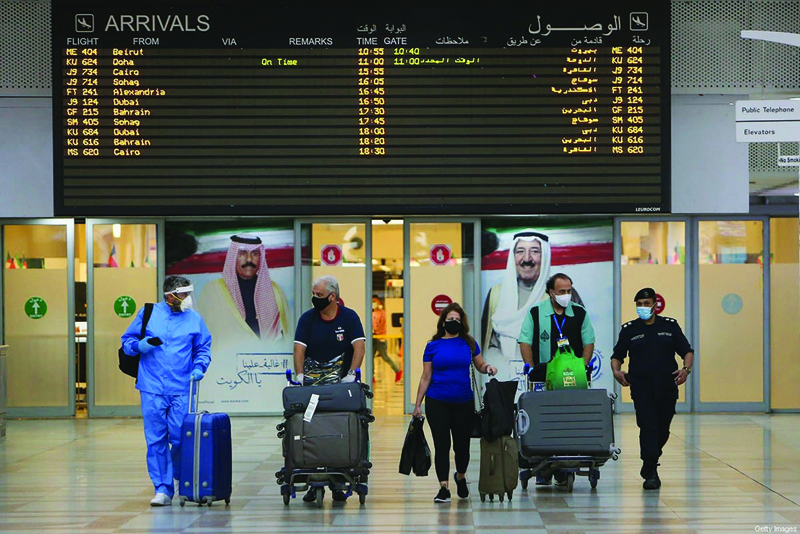 KUWAIT: In this August 1, 2020 file photo, passengers arrive at Kuwait international Airport. Kuwait's Civil Aviation Authority yesterday suspended direct commercial flights with India at the recommendation of health authorities. - Photo by Yasser Al-Zayyat
KUWAIT: In this August 1, 2020 file photo, passengers arrive at Kuwait international Airport. Kuwait's Civil Aviation Authority yesterday suspended direct commercial flights with India at the recommendation of health authorities. - Photo by Yasser Al-ZayyatBy B Izzak and agencies
KUWAIT: Kuwait's Civil Aviation Authority yesterday suspended direct commercial flights with India at the recommendation of health authorities after a steep rise of coronavirus cases in the South Asian country. The indefinite suspension took effect from Friday midnight. Passengers arriving directly from India are banned from entering Kuwait unless they have lived at least 14 days in a third country, a statement by the Civil Aviation said.
The ban exempts Kuwaiti citizens and their close relatives - spouses and children - and their domestic helpers. Air cargo flights will continue to operate normally, the statement said. "In view of the health situation, it has been decided to suspend direct commercial air links with India until further notice," the Kuwaiti government tweeted late Friday.
Expatriate workers make up some 70 percent of Kuwait's population and include hundreds of thousands of Indians. The region's busiest international air hub, the United Arab Emirates, had already announced on Thursday that it would suspend flights to and from India from today. As the clock ticked down to the shutdown of the air corridor between India and the UAE-one of the world's busiest-fares soared as Indians who could afford it scrambled to escape the COVID surge
India's daily coronavirus death toll set a new record yesterday as the government battled to get oxygen to hospitals overwhelmed by the hundreds of thousands of new daily cases. Twenty patients died in one night at one New Delhi hospital suffering from oxygen shortages, medical officials said. A Delhi court said that the new pandemic wave had become "a tsunami".
Meanwhile, the Iranian authorities said yesterday that they were suspending air arrivals from India and Pakistan. "Flights to and from the two countries of India and Pakistan will be banned" from midnight, aviation authority spokesman Mohammad Hassan Zibakhsh said, quoted by state news agency IRNA. "There are no scheduled flights between Iran and India. Nevertheless, accepting connecting passengers from the noted countries will be banned."
Beyond the Gulf, Canada suspended flights from both India and Pakistan for 30 days, while the US State Department urged Americans to avoid travel to India, even if they are vaccinated. Concern has focused on one new strain of the virus in particular that has spread rapidly in India and has already been detected in Europe.
Meanwhile, Germany will shut out all travellers arriving from India apart from its own citizens, Health Minister Jens Spahn said yesterday, as a new variant has made the South Asian country the latest coronavirus hotspot. "We're very worried about the new mutation of the virus discovered in India. So as not to endanger our vaccination program, India travel has to be significantly limited," Spahn told the Funke newspaper group.
Berlin had already dubbed India a "zone with particularly high risk of infection" with effect from today. Germany is the latest of several countries to restrict travel from India over the new variant, following Canada, Britain and Kuwait. In India, queues of COVID-19 patients and their fearful relatives were growing outside hospitals in major cities across, the world's new pandemic hotspot, which has now reported nearly one million new cases in three days. Another 2,624 deaths were reported in 24 hours, taking the official toll to nearly 190,000 since the pandemic started.
More than 340,000 new cases were also reported, taking India's total to 16.5 million, second only to the United States. But many experts are predicting the current wave will not peak for at least three weeks and that the real death toll and case count are much higher. Stung by criticism of its lack of preparation ahead of the wave of infections, the central government has organized special trains to get oxygen supplies to the worst-hit cities. The Indian air force was also being used to transport oxygen tankers and other supplies around the country and to bring oxygen equipment from Singapore. The government has also pressed industrialists to increase production of oxygen and life-saving drugs.
Uttar Pradesh, a state of 200 million people, has imposed a weekend lockdown in a bid to curb the spread. In Delhi, the city government said it would begin setting up buffer stocks of oxygen. Delhi chief minister Arvind Kejriwal said "the government should take over all oxygen plants through the army". Many patients are dying outside hospitals in the capital because of the lack of beds and oxygen.
Twenty patients at the Jaipur Golden Hospital in the capital died during the night as it suffered oxygen shortages, the hospital's director told Indian media. He said that at one stage on Saturday morning, the reserve was down to 30 minutes and pressure had been reduced for the 200 coronavirus patients, most of whom were on emergency oxygen. One charity has set up an overflow crematorium in a car park, with makeshift funeral pyres built to deal with the mounting deaths. A Delhi High Court hearing a special petition on the pandemic measures said Saturday: "We're calling it a wave, it's actually a tsunami."









